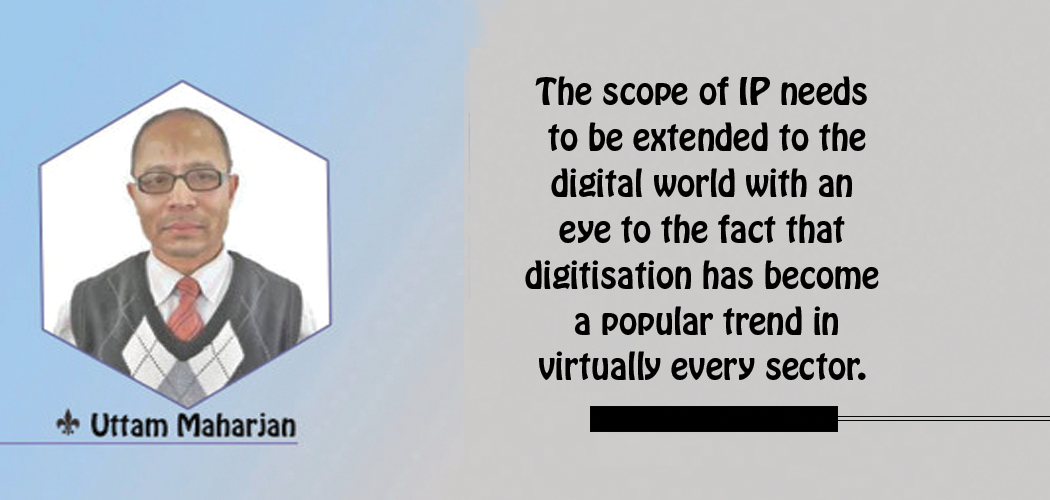- Sunday, 28 December 2025
Enact Intellectual Property Law
Uttam Maharjan
The TRIPS (Trade-Related Aspects of Intellectual Property Rights) Agreement is a legal convention between all the member states of the World Trade Organisation (WTO) aimed at protecting intellectual property rights. The TRIPS Agreement was negotiated in the 1986-1994 Uruguay Round. The Agreement was implemented on January 1, 1995.
The TRIPS Agreement allows member states to provide more extensive protection to intellectual property if they so wish. Nepal became a member of the WTO on April 23, 2004. By virtue of being a member of the WTO, the country is a member of the TRIPS Agreement. The nation is also a member of the World Intellectual Property Organisation (WIPO) and of the Paris Convention for Industrial Property.
Scientific innovations
Intellectual property (IP) refers to inventions, creations or ideas. IP benefits society as it motivates people to make inventions, create new things or generate ideas useful for mankind. IP spurs economic growth as it motivates people to engage in new scientific innovations and inventions and generate new ideas. IP can help the science and technology field grow. The country is backward in science and technology. IP may be categorised into industrial property and copyright. Various conventions and human rights declarations have provided for IP rights. Nepal’s constitution treats IP rights as fundamental rights.
As a member of the TRIPS Agreement, the country is obliged to fulfil various commitments. In fact, every member state of the WTO is bound to fulfill such commitments. The country is obliged to implement various provisions of the Agreement by enacting a new law on IP, reforming the existing law on IP and building capacity as per the commitments under the Agreement. The country is facing difficulty in meeting commitments under the Agreement. In fact, the country is lagging behind in fulfilling these commitments. However, the transition period for this has been extended to 2034 AD by the TRIPS Council. This is a relief for the country.
There are several benefits associated with IP. IP enhances the ability of a company to have competitive edge over other similar businesses. It enhances a company’s value in the market. A company can rely on IP to market its products and services. A company with an IP reputation can have easy access to financing. Further, IP generates export opportunities.
The country has its own Acts regarding IP. The Patent, Design and Trademark Act, 2022 BS provides protection for industrial property, including patents, designs, processes, trademarks, trade names and integrated circuit layout-designs. Patents protect inventions, designs, formulae and principles. Trademarks protect words, signs, pictures or a combination thereof. They differentiate one product from the other in the market.
On the other hand, the Copyright Act, 2059 BS covers modern forms of authorship and provides for adequate periods of protection. Copyright protects literary works, paintings, photographs and other artistic works. It provides protection for authors and holders of other forms of copyright such as performers, sound recording producers and broadcasting organisations. Their works cannot be misused by others. If someone wants to use such works, he or she has to seek permission from them or pay royalties to them. So provision for copyright protects their works from misuse or violation.
The Department of Industry is an institutional mechanism for the protection of industry property. It is a focal point of WIPO on behalf of the country. It is involved in the settlement of disputes and administrative procedures. On the other hand, the Copyright Registrar’s Office is an institutional mechanism for the administration of copyright laws.
The Patent, Design and Trademark Act, 2022 BS is out-dated. The act cannot fulfil the new and emerging requirements regarding IP. Even the Copyright Act, 2059 BS needs to be revised keeping abreast of the changing times and requirements. It may be noted that the country formulated an IP Policy in 2073 BS, which has served as bridgehead for the formulation of required laws. A draft law on IP has also been drawn up, which has been under discussion for years.
The draft law has made improvements over the existing IP law and regulations. It has tried to codify all industry property laws in one place. It has also tried to make the country’s IP law compatible with international IP standards. It contains several industry property concepts and good practices. Moreover, the scope of IP is proposed to be extended to geographical indications, trade secrets, traditional knowledge, biodiversity, farmers’ rights, artificial intelligence and the like.
Autonomous IP office
The draft law has proposed, among others, national treatment to foreign IP on a par with domestic IP, an electronic system for registration and administration of IP, provision for well-known trademarks, provision for compulsory licensing, regulation of anti-competitive practices with regard to licensing, patentability, novelty and inventiveness in industrial applicability; and provision for a single government entity. In fact, a separate autonomous IP office is required to deal with IP issues. Such an office needs to be equipped with skilled and competent manpower. Further, the scope of IP needs to be extended to the digital world with an eye to the fact that digitisation has become a popular trend in virtually every sector.
As stated above, the proposed law on IP has been under discussion for years. Failure to enact the relevant law on IP in time has shown the government’s nonchalant attitude towards IP issues. It is high time the government expedited the enactment of the proposed law on IP.
(Maharjan has been regularly writing on contemporary issues for this daily since 2000. uttam.maharjan1964@gmail.com)















